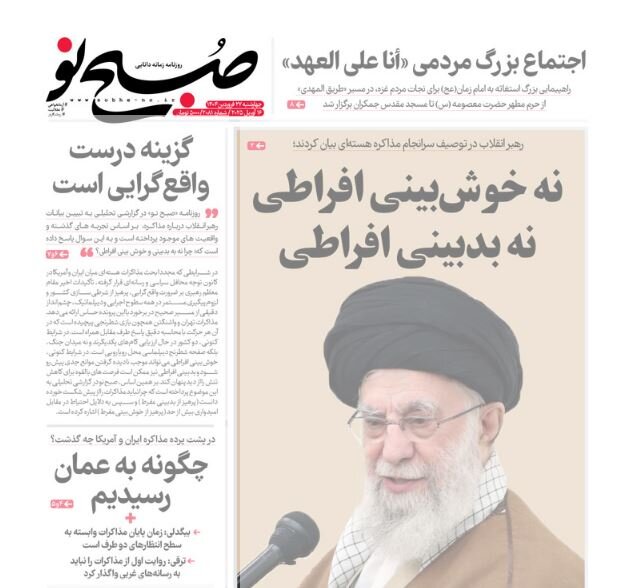INSUBCONTINENT EXCLUSIVE:
TEHRAN - In an analysis, Sobh-e-No addressed the exclusion of Europe from the negotiations and wrote: From the view of many experts and
analysts of international issues, removing Europe from the Iran-U.S
negotiations process not only means reducing diplomatic complexities but also brings strategic benefits for both sides of the negotiation,
especially Iran.One of the most important benefits is freedom from time-consuming and fruitless European processes
Analysts believe that Europe was not only not neutral at many points but also practically acted in coordination with the United States in
In recent years, instead of playing the role of a facilitator, Europe has acted more as a pressure tool; from issuing political statements
to imposing symbolic sanctions
Without Europe's involvement, Iran will have more space to pursue its diplomatic initiatives
Some analysts consider the exclusion of Europe a strategic move to break the fake power structure in the West
For years, Europe tried to control the situation and maintain its diplomatic image by pretending to be multilateral, but in reality, it
Removing them would also open the field for a franker dialogue.Siasat-e-Rooz: Negotiations are not everythingSiasat-e-Rooz said it is
essential not to tie the country's economy to negotiations and wrote: Linking the country's economic issues to negotiations (during the
Rouhani administration) was a big mistake because whenever there was a disruption in the negotiation process or a disagreement arose, the
first sector affected was national economy, which influenced the livelihood of the people
The other side of the negotiations also realized this issue, which made it a tool to put more pressure on Iran
The negotiations are for the lifting of the illegal inhuman sanctions that the United States has imposed on Iran, and it is unthinkable that
this country will play a fundamental role in the progress and development of Iran, even with a possible dismantling of peaceful nuclear
technology in Iran or dismantling of military weapons, especially missiles
If the negotiations do not go well on Saturday (April 19) or if there is no positive sign, it will affect the livelihoods of the people
To prevent this, an economic plan must be ironed out to control the situation.Shargh: The opportunity should be used in the best wayIn its
It said: On the first day of this week (April 12), high-ranking diplomats of Iran and the United States held (indirect) talks
The high significance of this contact is that it took place with the representative of a radical Republican government in the United States
Given the developments and experiences of the last few decades, as well as the positive contact between representatives of Iran and the
United States on Saturday (April 12), Iran, instead of just focusing on the nuclear program and sanctions related to the nuclear program, it
should propose that the two countries should have the opportunity to raise all their concerns during the talks for the complete lifting of
sanctions, both primary and secondary under all claims
Other issues could at most include the missile program (of Iran), which, considering the military programs of other regional countries, Iran
has the ability to defend its rightful missile program
Regional issues are also another issue, an important part of which has been forgotten in the last two years.Kayhan: National dignity and
interests must be preservedAlthough negotiations with the United States are raised by some groups with the slogan of lifting sanctions and
improving livelihoods, the experience of the past years has shown that these talks have always been a tool for imposing America's hegemonic
will and gaining concessions from Iran
The failure of Washington's maximum pressure policy, the retreat from military threats, and ultimately the return to the negotiating table
have once again proven that the strategy of active resistance and relying on domestic capacities can help the country more than "trusting in
political smiles." Negotiations with the United States, although carried out with the slogan of lifting sanctions and securing the interests
of the nation, have always been a tool for pressure, influence, and imposing the will of the arrogant hegemonic system of the United States
The historical experience of the Iranian nation has proven that trust in the United States has not only brought no benefit for the country
but has instead paved the way for increased pressure and further audacity from the enemy
Islamic Iran, relying on its internal capacities, regional power, and popular support, has proven that it does not need Washington's
deceptive smiles, and any negotiation only makes sense when national dignity and interests are preserved.
This article first appeared/also appeared in Tehran Times

